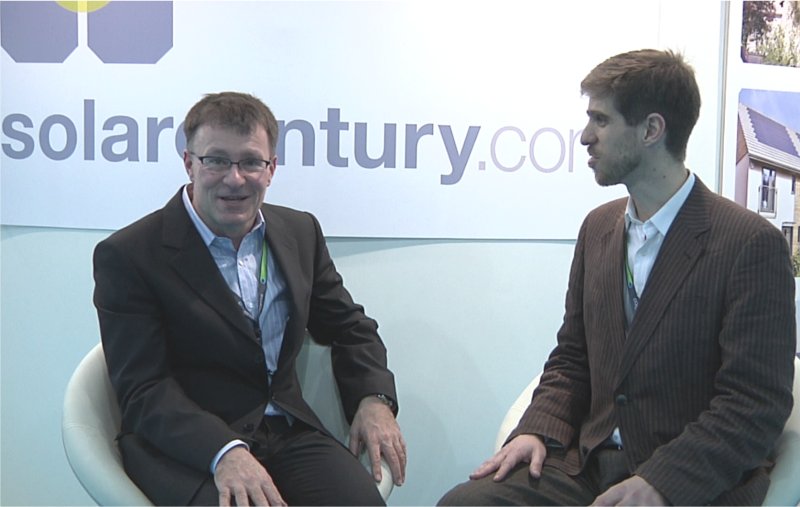At Ecobuild 2013, we had the opportunity to talk to various members of Solarcentury, the UK’s most experienced solar energy company and a beacon of innovation. Among them Alan South who has over 20 years technical and leadership experience in innovation, at IDEO and Cambridge Consultants. He also holds engineering degrees from the University of Bath and Imperial College London, and a Masters’ degree in design from the Royal College of Art.

Alan South: My name is Alan South. My role at Solarcentury is Chief Innovation Officer. I’m responsible for our proprietary products and services like the PV tiles and slates you see here on the stand. I personally have quite a significant interest in the adoption of renewables by households, so I have a point of view that I’d be very pleased to share with you.
Alvaro Feito: What are the barriers for adoption of renewable energy? What is holding back domestic renewable energy?
A. South: I think it’s one of these things that I call a multi-point problem. It’s not one thing. Because if it was one thing, someone would have found it and solved it. There are a whole range of barriers. Fundamentally when you talk to people they say they love the idea of renewables. They want a house that is green, they want to protect their family from future increases in energy bills. Everybody fundamentally loves the idea. So …
What are the barriers?
1. Barrier number one: It is not yet a mature industry. There is a whole set or services where you can pick up a phonebook and look up the classification for roofers, garages, landscaping … and you know who to contact. But it’s still a young industry. If you ask a household if they want a heat-pump or a solar PV panel, they will say “Well, who do I call?”. That’s a barrier that in time will fade.
2. The next barrier concerns the next step. They might say: “I’ve had this company call me back. But I think they are only 4 people. They are really nice people, I feel I can trust them. But will they be in business in a few years if I need to claim my warranty? Again, in time this barrier will fade.
3. There’s also a question of confusion. A big amount of confusion. And I think the renewable industry often doesn’t service customers very well because it talks in very technical terms. So if you put yourself in the mind of the consumer or householder, they have been used to paying electricity bills. The probably use the word units rather than kilowatt-hours, and they are used to the idea that they pay this bill but electricity just comes along. And all of a sudden they are asked to take control of what they are doing. And that may feel like a step too far. So the technical nature of renewable sales may be also a barrier.
4. I think another barrier is that consumers have become used to the idea that technology comes along. But then it turns out not to be the right technology, or sometimes better technology comes along. It happens with computers, video, video recorders, etc. So there’s a sense that it might be a good idea to wait for the next innovation.
A. Feito: Do you think people are aware of the drop in price in the last 3 – 4 years?
A. South: I think they are. I think they are aware of the degree with which the prices have dropped. So they might say let’s not do it this year but do it next year. So there’s all manner of barriers. And I think the really successful companies are going to start to tackle these barriers. So when the successful consumer facing companies start to understand these barriers, and start to find solutions the barriers will fall.
A. Feito: So you’ve spoken about the maturity of the industry and how this results in a certain lack of transparency: It’s not so easy to find a supplier or to choose the right one. Another side is the rapid evolution of the technology and the challenge of finding the right time to invest. So what needs to happen to address these barriers? Can we make it more transparent? Easier to choose?
A. South: There are two possibilities. One is to solve the problem directly, which is to make things much more clear and much more transparent. And maybe that can work, I’m not sure. I think it’s part of the solution. I think the other part of the solution which has worked in so many other industries is the development of consumer facing brands. So an awful lot of quite complex decisions are being made by humans all the time. And the branding and the trust in that brand plays a big part in it. So to repeat:
One way is to tick off each little barrier one by one. To try and reassure the consumer. But that starts in my mind to become a consumer education program. And whilst I think there is some merit in that, it’s often a very difficult and expensive thing to do. I speculate that perhaps what we will see is development of trusted brands. By way of example a company I admire tremendously that has created a consumer facing trusted brand is Solar City in the US. And I believe the excellent performance they are achieving as a business comes as a result of a good understanding of the purpose of a consumer facing brand.
We would like to thank Alan South for taking the time to answer our questions and ask that very question to our readers: What do you think is holding back domestic renewable energy? And what do you think companies and consumers can do to change that?